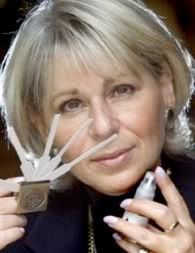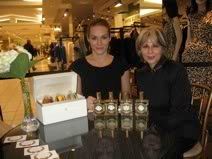
She also happens to be a fan of Perfume Shrine, has been gloriously generous in her communication with me and she did us the honour of sitting to a questionnaire on assorted perfume matters. Here it is, with a second part following shortly!
~Perfume Shrine: First of all: Is perfume art? And how can it be defined as such? For instance, in typically acclaimed as such arts, ie. painting or music, there is a qualitative and quantitative evaluation of any creation based on what seems a standard set of “rules” devised over the years: the brushwork, the technique of shading and light, the respect of proportion or its -perhaps intentional- distortion, the sequence of leitmotifs or not and the adherence to a form such as the sonata or the fugue etc. What could be comparable in perfumery?
Marian Bendeth: I believe the creation of perfumery and perfumers are born of sheer artisanship. Two hundred years ago and up to the middle of the twentieth century, certain houses created distinctive signature styles that claimed their identity as a Fragrance House. Names such as: Guerlain (who had the Guerlinade signature accord running through their scents), Houbigant, Yardley’s, Coty, Penhaligon’s, E. Coudray, Chanel, Jean Patou and Dior come to mind. There was a distinctive theme or accord that was instantaneously recognizable.
For the majority of modern releases today, these thematic scents have taken a backseat to original and distinctive launches under the umbrella of a particular name.
What makes a blend distinctive though, is the way a scent unfolds upon first sniff to the last embers of the drydown. The quality in accords, the way a fragrance unfolds can be part of the defining factors of what I call the Comet theory, where a scent may be top heavy for the first few minutes and then fades just as quickly. The blend should be seamless on the skin taking the nose in a wonderfully fluid direction with surprises along the way. Think of a gymnast dropping a ball or a drummer who is drumming offbeat to the other players. Cohesiveness and continuity are two words to look for. Longevity is a must for the wearer and must be considered before purchase.
True artistry in perfumery is the marriage of notes that may juxtapose each other but become harmonious in a blend. Born of pure creativity and an astounding knowledge of literally thousands of synthetics and hundreds of Essential oils, they must possess the ability to marry disparate and conjugal notes into a harmonious blend.
~There are two distinct theories of wearing fragrance: one is having a signature scent, the other a fragrance wardrobe or even collection for serious perfumeholics. Each one has its own advantages and disadvantages. I remember myself falling madly in love with Opium as a young teenager: I always fantasized that it would be my calling card and the memento of me that I would leave to my loved ones after I had ceased to exist on this plane of life. I still love it to bits, but even then I also enjoyed wearing other things too. What’s your advice on how can people reconcile the two: keeping the best bits of each world?
I am not a believer of only wearing one signature scent at all. It is passé and reveals a stagnant personality who, believing their association with a particular scent as one who is frightened of change. The concept of fragrance wardrobing is not unlike our varied tastes in other pastimes such as colours and fabrics in fashion, reading, food tastes and routine. Each scent we pick for ourselves reveals a different slice of our personalities. For those who wear uniforms to work, there can be a deep frustration in not being able to reveal their colour choices, thus, self expression and this will ultimately reflect on one’s psyche.
The key to enjoying a fragrance purchase is to hold back and not exhaust it. I recommend wearing a scent for two days and going back and re-experiencing your new scent as you would a lover! Anything in overdose mode is not good for you – perfume included. In fact, those who wear a signature scent tend to put on far too much due to olfactory fatigue and the rest of us have to smell copious doses of it as our noses are not desensitized.
I recommend holding onto those scents you love but variety is the spice of life as well.
~Is having a signature scent the only way to make your olfactory mark on someone’s memory? And how would one choose something unique in a market that is saturated with similar offerings?
Creating memories through fragrance can be by chance or predetermined. It is the impact of fragrance on the wearer’s psyche that should be foremost in one’s mind before application. Discernment and etiquette for choosing the appropriate scents in a given environment reflects a particular savvy which gets lost on the masses.
Although the end stories, after purchase are truly fascinating to me, it is also the impact a particular scent or scents may have on an individual which can be the most intriguing. If a scent can enhance one’s self esteem, confidence, sexuality or bring out one’s humour, patience or adrenalin then the job of the Perfumer is done. It is also extremely key to the purchase and wearing of fragrances.. It should not always be about emulating a person or lifestyle but rather bringing out the best in who we are and allowing the scents to speak for us subliminally; now that can be very sexy indeed.
~Working as a fragrance consultant expert presents its challenges. One of them should be that after a while one might become a bit formulaic, typifying people in distinct groups: do they fall indeed into some classic patterns and how do you avoid being repetitive or is every new consultation different?
Although I do work with the media who would love for me to pigeon-hole and blanket statement fragrances, these kind of profiles do make me a tad uncomfortable because everyone is so unique and can wear the same scent in a totally different way. What is fascinating though, are the thread of commonalities between disparate groups of people from all walks of life, different ethnicities, religious, cultures and ages based on their tastes and lifestyles. Each fragrance and classification may typify particular personality traits but when combined with other fragrances from other classifications, reveal more of the personality of the wearer. I like to say, fragrance is your walking biography.
Yes, every single person I consult with is totally unique and different. Some have a lot in common based on tastes, others are polar opposites. Although most tend to stick with two or three classifications but then they might become another classification based on their own personal body chemistry. I have just made it a Science.
~Do you recall a particularly difficult client? What was the challenge? Tell us an anecdote!
The worst kind of client is one who is closed down emotionally and who is scared of scent. In order to fully appreciate and respect testing and wearing fragrance, one has to go places that are emotional and many are literally petrified of going there.
The hardest are those who have preconceived ideas about fragrance or particular notes whereby negative comments come out before I even recommend anything. I recall one woman saying she”hated” every single fragrance on the market because: she had allergies, couldn’t stand any kind of florals, hated the smell of woods, loathed anything sweet, powdery, green (because that meant sneezing) light, dark, woody, citrus, couldn’t wear Essentials, couldn’t wear synthetics, hated foody notes, spices gave her headaches, resulted in stomach cramps, her eyes and limbs hurt, you name it, she suffered it like a true victim and wrote off all scent!
I later found out in the conversation, she lost her husband to a younger woman who wore sophisticated scents that permeated his shirts! It was finally revealed, the association was too much to bear and her self-esteem had plummeted; she had subliminally positioned fragrance as the ultimate villain in pain, betrayal and sexuality.
I convinced her to at least test two on the inner wrists. She ended up loving them on herself after learning which notes her body picked up. The transformation of negativity to absolute exaltation was breathtaking. It took about two hours but it was a wonderfully rewarding investment of time. Her worst “enemy” was now her best friend in self esteem and renewal for someone new! I loved that.
~Personal chemistry is a controversial topic: some experts argue that no such thing exists and that perfumes smell about the same on anyone; others -among whom many consumers- believe that factors such as diet, hormones, medicine and skin Ph influence the performance of perfume on skin. Others still, like Dr.Bloch, go as far as to suggest there is an inherent difference of personal smell according to race! How is it possible to monitor such reactions, if at all, when giving recommendations?
I have dedicated most of my formative years and in the fragrance industry for the past twenty-five years as a Fragrance Expert, ascertaining the differences in body chemistry. This is my specialty and I am a pioneer in this field. Anyone who denies body chemistry isn’t realistic and I must confess,those comments make me laugh a little. That is like saying all blue eyes are the same shade or everyone tastes in food are the same. What is one man’s bread is another man’s poison! One thing is for sure, everyone of us is unique!
I conduct personalized fragrance consultations with over a 1,000 + fine fragrances, prestige and niche, and very rarely does any one scent smell exactly the same on two skins. Having said that, I am also horrified when I hear salespeople claim that darker skins can only wear Orientals, while Redheads can only wear florals etc. This kind of thinking smacks of racism to me and is blatantly false and very dangerous.
For example, Toronto has over 126 minorities from all over the world which is why my job is so fascinating and challenging. Cultural odours do play a big role in fragrance selection, depending on where that person is raised. For instance, if we have someone born in the West Indies, but who immigrated to Denmark, they might gravitate towards familiar spices used in cooking but conversely, might be attracted to green, wildflower or oceanic scents as well. The nose may say one thing and sometimes, the body something completely different. I am the broker between my customer’s nose and skin.
I also think it is important to note, that criticism of particular scents should never be taken at face value. One person’s assessment of a particular fragrance is just one’s opinion. Many times, I may recommend something that I personally may dislike or not wear, but that would never cloud my judgement for my customer. I may read someone slam a particular fragrance and I recall how incredible it was on a number of my clients and it saddens me to think that now, possibly someone will formulate negative attitudes based on a critique. You have to test them for yourself!
It can be so exciting too, when one can smell a fragrance that smells of perfection on the right skin. My only frustration is that the Perfumer/Perfumers are not there to smell them with me because I know this is how they wanted their scent to sit! I recommend for fragrance lovers to really dedicate the time in understanding how long particular scents may last on their skin. That information can be liquid gold to any fragrance salesperson.
~Is it possible to obliterate personal chemistry to attain a level of fragrant loveliness such as the one demonstrated by another wearing a scent we admired?
Personal body chemistry in tandem with a fine fragrance can equal a wonderful smelling wrist or neck, or not. Our natural oils are like DNA and are unique to us. They can be modified slightly by ingesting certain foods, pills, diet etc but they can never be obliterated.

Every single person I have encountered in the industry since day one, has enriched my life and knowledge with fragrance and their personal stories! I see each and every one of them as precious jewels that fill up my treasure chest of knowledge and fascinating conversations! They may be designers, jewellers, Niche owners, receptionists, Retailers, Special Events, Beauty Editors, Raw material manufacturers, Evaluators, Marketing people or labourers and everything in between! Of course the Perfumers have to be extremely close to my heart and those individuals who make a global difference such as: Annette Green, President Emeritus of the Fragrance Foundation or Michael Edwards, Author/Expert of Fragrances of the World.
I was very fortunate to win another Best Media Editorial Award with Basenotes.net last month at the Canadian Fragrance Awards with two articles of interviews with Les Christoph’s - Christophe Laudamiel and Hornetz who created the Mugler Coffret for Perfume, the story of a Murderer. These young Perfumers are the cutting edge of where perfumery is heading: abstract, historical, environmental and eclectic scents that shake up the flower petals and bring forth intricate and brilliant bends that mimic another era that we can smell in 3D!
I dedicated the award to the all the non-scent, non-odour nay-sayers out there because without odours, positive and negative, there would not be humanity! And perfume is the very, very best of it!
Each Creative Perfumer has his or her own private formula for creation and creativity. I love the idea of the seed or birth of an idea. I don’t mean the company’s brief, which sometimes is too general or too fastidious. One can never make the claim that they know every single thing about the industry from the Sociological, Anthropological, Sciences, Flaconnage and it’s industries Marketing, Harvesting, Manufacturing, Historical, Physiology, Consumer, Retail and Technical and Perfumery areas because there are so many specialized fields that mold together to become one on the shelves.
~Finally, to inject an ancient Greek philosophical spin on things, is the notion of bad and good smells inherent, as in “avoid the rotten meat, opt for the juicy fruit” or is it nurtured as in “babies don’t get disgusted by touching their own poo” in your opinion? Please discuss.
Parents don’t take the time to teach toddlers how to smell but they do impart positive and negative views that become ingrained in a child’s psyche into adulthood. In general, if a parent doesn’t wear scent, chances are, one of the children won’t either.
I would love to see smell as part of the teaching curriculum in junior kindergarten and public schools. The sad fact being, most of these schools in North American are banning scents which is to deny the best of our senses.
Marian Bendeth
Global Fragrance Expert
Sixth Scents
Please check back for a very Fun Interaction with Marian next in which she describes several scents in vivid portraits of optical, auditory and tactile media.

Pics copyrighted by Marian Bendeth and used on Perfume Shrine with her permission.
.jpg)




.jpg)

I've always enjoyed her writings, and I thoroughly enjoyed this interview with Marian. I first discovered her on Basenotes, and every time I am astounded by her insights.
ReplyDeleteShe is formidable, isn't she?
ReplyDeleteI first was impressed by her while reading all the different linguistic uses of "nose" and "smell" in The Magnificent Proboscis: I then knew she was special :-)
Her communication has been also a revelation.
I agree that one's chemistry has a lot to do with what perfumes we wear and how we wear them. I'm glad to see it by an expert.
ReplyDeleteI loved her comment that without odors/scents, there would be no humanity.
I know someone who dislikes all fragrance. I'm careful what I wear around her. She said once that only once or twice was there something she disliked on me.
I love having a fragrance wardrobe. There were a couple of times in my life where it seemed like I had a signature scent, but they never lasted. I prefer to let my life dictate what I choose, either to enhance or change.
I tend now to get bored with one or feel I get tired of it (which I don't want to do with things I love.)
Dear Karin,
ReplyDeleteit is validating to see one's experience corroborated, isn't it?
It's wonderful to be able to enhance or change, as you say, your mood through such an easy medium as fragrance!
A little moderation, I think, is the best way not to oversaturate oneself in something we love, therefore prolonging the pleasure.